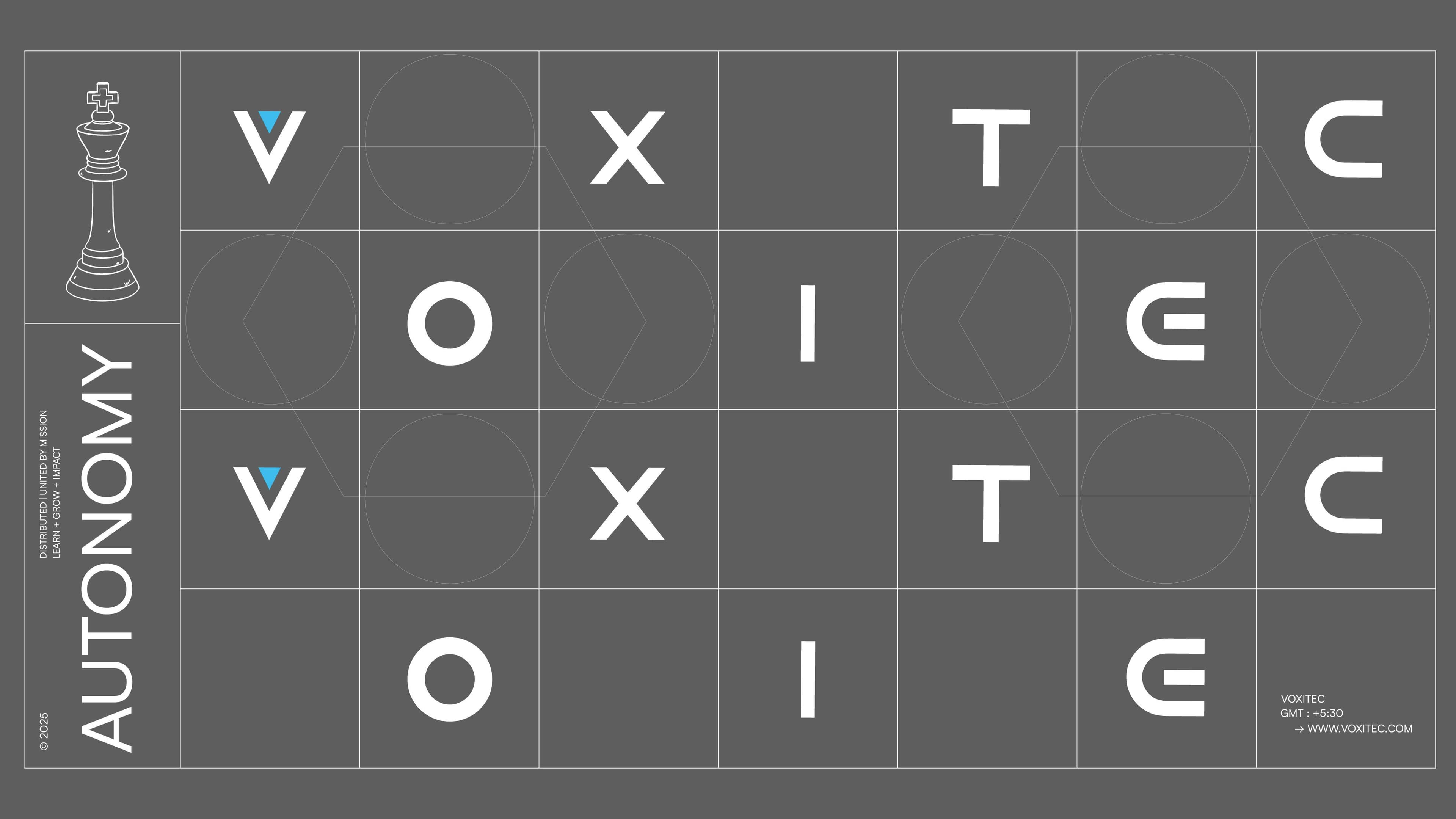How Autonomy Drives Successful Mission Execution
In a fast-moving environment, every delay risks losing momentum — and momentum is everything when it comes to mission execution. At Voxitec, one of the most powerful ways we keep work flowing is through autonomy: the trust and freedom for people to make decisions.
Autonomy is not about doing whatever you like; it is about setting a clear direction and empowering people to reach it in their own way. This approach ensures that our mission is never slowed by unnecessary bottlenecks, but instead moves forward with speed, precision, and purpose.
Within days of starting at Voxitec, I was asked to conduct a set of interviews under the supervision of my manager. I had only been told a couple of days beforehand to prepare, and at first it felt daunting. What stood out to me, though, was the trust placed in me. Instead of waiting weeks to be eased in, I was given real responsibility straight away. That experience did not just accelerate my learning, it gave me the confidence to contribute meaningfully from the very start. It also captures what autonomy means at Voxitec: trust, responsibility, and the freedom to act.
At Voxitec, autonomy is not a side benefit. It is how we work, and it is one of the biggest reasons we consistently meet our mission with speed and precision.
Understanding Autonomy: What It Really Means
Autonomy at work means leaders define the what and the why, while team members decide the how. That balance of independence and accountability makes people more engaged, more willing to take ownership, and more likely to deliver exceptional results.
This is backed by research. In the 1970s, psychologists Edward Deci and Richard Ryan identified autonomy as one of the three core human needs in their self-determination theory. Decades of studies since then have shown that autonomy fuels motivation, creativity, and long-term commitment. At Voxitec, this principle is not abstract. It is visible in the way teams approach problems, share solutions, and deliver outcomes with speed and precision.
Autonomy vs. Micromanagement (and Chaos)
Too many rules slow progress. Too few, and you risk confusion. The sweet spot is structured freedom: clear boundaries with room for independent decision-making.
Never tell people how to do things. Tell them what to do and let them surprise you with their ingenuity.
— General George S. Patton
In traditional corporate setups, ideas often stall in long approval chains. At Voxitec, we take a different approach. Interns and team members are encouraged to test ideas quickly, share what works, and learn from what does not. This speeds up problem-solving, builds confidence, and often uncovers better ways of working than a top-down process could provide.
How Autonomy and Small Teams Drive Innovation at Voxitec
History shows us that many breakthrough innovations, from the Wright brothers’ airplane to the first iPhone, did not come from massive teams or endless committees. They came from small, focused groups with clear goals and the freedom to execute.
At Voxitec, we work in the same way. Our teams are small and agile, with each person bringing deep expertise while also being trusted to step beyond their role when needed. This flexibility keeps us nimble and allows us to tackle complex challenges quickly and effectively.
Autonomy is also what sparks innovation. When people feel trusted, they experiment, take calculated risks, and push for novel solutions. Research from the University of California, Davis, supports this. It found that curiosity primes the brain’s memory and reward systems, making learning both easier and more enjoyable. By giving team members the freedom to shape their approach, we create the conditions for curiosity to thrive. That spark accelerates learning, strengthens problem-solving, and fuels a culture of innovation.
The Challenges of Doing Autonomy Right
Autonomy is different from chaos. Without clear goals and accountability, priorities can drift, and progress can stall. That is why communication, regular feedback, and shared understanding of what success looks like are essential.
It is also important to recognise that cultural backgrounds and personal work styles shape how people view autonomy. Some thrive on complete independence, while others prefer autonomy supported by close collaboration. At Voxitec, we balance both, ensuring freedom is paired with connection and support.
How We Build Autonomy into Voxitec’s Culture
From day one, everyone, whether an intern or senior engineer, is encouraged to take ownership of their work. We set measurable goals for every role, make our priorities visible across the team, and ensure everyone has the tools and resources they need to succeed.
We actively support self-directed learning and welcome fresh ideas from all levels of the company. Initiative is recognised and rewarded, and by keeping meetings lean, we protect time for deep, focused work. This balance keeps accountability high without slowing down creativity or momentum.
Final Thought: Autonomy is a Force Multiplier
At Voxitec, autonomy is not just about making work more enjoyable; it is a strategic advantage that drives speed, sharpens problem-solving, and delivers stronger outcomes.
For leaders elsewhere, the lesson is clear: when you replace micromanagement with mission clarity and confidence in your team, autonomy becomes a force multiplier. It transforms good intentions into real progress — and it turns good teams into exceptional ones.


